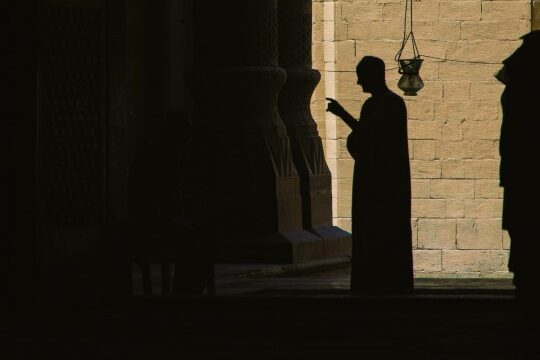Another famous description of the characteristics of awliya was given by Sayyidina `Ali, as related by Ibn al-Jawzi in the chapter devoted to him in Sifat al-safwa:
They are the fewest in number, but the greatest in rank before Allah. Through them Allah preserves His proofs until they bequeath it to those like them (before passing on) and plant it firmly in their hearts. By them knowledge has taken by assault the reality of things, so that they found easy what those given to comfort found hard, and found intimacy in what the ignorant found desolate. They accompanied the world with bodies whose spirits were attached to the highest regard (al-mahall al-a`la). Ah, ah! how one yearns to see them!
The knowledge of the awliya’ may attain higher levels than that of any other knowledge of humankind and jinn including in certain cases even the knowledge of Prophets. The preternatural knowledge or powers which Allah bestows on some of His friends (awliya’) who are not Prophets have a firm basis in the Qur’an: for example, the wali who was with Prophet Sulayman and brought him the throne of Balqis faster than the blink of an eye. He was characterized as “one who had knowledge of the Book” as Allah stated:
One with whom was knowledge of the Scripture said: I will bring it thee (O Sulayman) before thy gaze returneth unto thee… (27:40)
and this is Prophet Sulayman’s scribe Asif ibn Barkhya according to the Tafsir Ibn `Abbas and the majority of the scholars, i.e. a non-Prophet human being:
“One with whom was knowledge of the Scripture”: i.e. an angel… or Jibril… or al-Khidr or Asif ibn Barkhya Sulayman’s scribe, which is the most correct, and the jumhur (majority) agrees upon it…31
Similarly, al-Khidr — although considered by many to be a Prophet — possessed knowledge which Prophet Musa did not have and he is characterized as “one of Our slaves, unto whom We had given mercy from Us, and had taught knowledge from Our presence” (18:66).
However, the greatest of Allah’s Friends are those of the Community of the Seal of Prophets, and it is in this sense that Abu Yazid al-Bistami’s declaration must be understood whereby “We have crossed an ocean on the shores of which stood the Prophets.” That is: the awliya’ of the Community of the Prophet Muhammad, blessings and peace upon him, have inherited from him a knowledge and a position which the Prophets of Banu Isra’il yearned to attain. This is established by the hadith of Abu Malik al-Ash`ari we have just cited, and yet this does not contradict the fact that the Prophets are by far Allah’s elect in creation, as Imam Tahawi’s article of faith makes clear:
We do not prefer any of the saintly men of the Community over any of the Prophets but rather we say that any one of the Prophets is better than all the awliya’ put together.32
The word for both vision and true dream is ru’ya, which Allah mentions in the Qur’an thus: “Allah has fulfilled the vision (ru’ya) for his Messenger in very truth” (48:27). The Prophet said:
The vision or dream (al-ru’ya) is one-forty-sixth part of prophecy.33
When the Time draws near, almost no vision or dream of the believer will be false. The believer’s dream is one-fortysixth part of prophecy, and prophecy never lies.
Whoever sees me in vision or dream sees me (truly), for Satan cannot take on my form, and the believer’s dream is one-forty-sixth part of prophecy.



